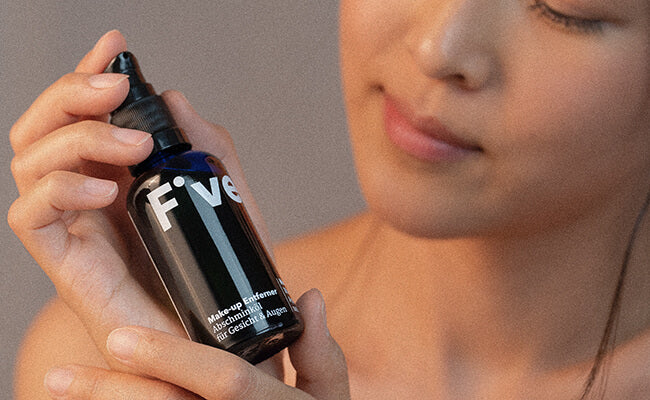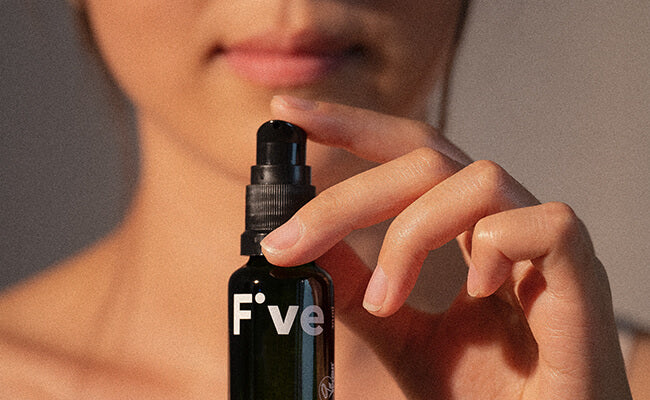Feuchtigkeitsmangel betrifft nicht nur trockene Hauttypen
Manch eine hatte schon trockene Haut, als sich ihre Freundinnen über Pubertätspickel geärgert haben. Bei anderen stellt es sich erst später ein, das Gefühl, dass es der Haut an Feuchtigkeit fehlt. Zu den typischen Anzeichen gehören Spannen, spröde oder gar schuppige Stellen, Juckreiz, feine Trockenheitsfältchen und ein Mangel an Elastizität.
Der Feuchtigkeitshaushalt kann bei jedem Hauttypen durcheinander geraten. Das gilt nicht nur wenn die Haut zu wenig Fett produziert, also beim trockenen Hauttyp. Auch normale Haut, fettige Haut und Mischhaut können sich mitunter trocken anfühlen. Man spricht dann von feuchtigkeitsarmer Haut, der es temporär an Wasser fehlt.
Dabei sind die Ursachen ebenso verschieden wie die Ansprüche, die die Haut an ihre Pflege stellt. Lerne deshalb zu verstehen, wie du deine Haut optimal unterstützt! Dazu ist dieser Artikel da.
☝️ Fehlt es deiner Haut an Feuchtigkeit, weil sie zu wenig Fett produziert oder weil sie dehydriert ist? Beides fühlt sich sehr ähnlich an, braucht aber eine völlig andere Pflege. Geh also der Ursache auf den Grund!
So speichert die Haut Feuchtigkeit
Für jede Haut ist Feuchtigkeit essentiell. Deshalb ist es wichtig, dass du verstehst, wie deine Haut Wasser speichert. Sie bindet Feuchtigkeit mit einer Kombination von wasserliebenden Substanzen. Das Feuchthaltemittel der Haut besteht aus Aminosäuren, Glycerin, Hyaluronsäure und mehr und wird NMF genannt für Natural Moisturizing Factor. Du kannst dir diese Stoffe wie kleine Magneten in deiner Haut vorstellen, die Wasser anziehen und festhalten.
Doch ist der Zug zu stark, fällt auch einem Magneten mal etwas herunter. Besonders Wichtiges sichern wir vielleicht zusätzlich mit einem Streifen Tesa. Die Haut macht es ganz ähnlich. Sie sichert ihr Wasser doppelt ab und zwar mit der Hautbarriere. Diese Schutzschicht aus Hornzellen, die mit Lipiden gekittet sind, dichtet die unteren Hautschichten ab und verhindert eine übermässige Verdunstung.
☝️ Du willst es ganz genau wissen? Mit dem Beitrag Wie speichert meine Haut Feuchtigkeit? steigst du tiefer ins Thema ein.
Ein Problem, zwei Ursachen
Es gibt also zwei Faktoren, die den Feuchtigkeitsgehalt deiner Haut sichern. Da ist zum einen das Vorhandensein von genügend „Wassermagneten“. Zum anderen ist es eine intakte Hautbarriere, die den Feuchtigkeitsgehalt der unteren Hautschichten reguliert. Passt eines davon nicht, oder beides, steigt der transepidermale Wasserverlust (TEWL). Das Problem lässt sich also auf verschiedene Ursachen zurückführen: eine gestörte Barriere oder einen zu geringen NMF oder beides zusammen.
Deshalb gibt es auch zwei verschiedene Ansätze in der Kosmetik: reichhaltige Produkte mit einer Betonung auf Ölen (für die Hautbarriere) und federleichte Hydration auf Wasserbasis (für den Natural Moisturizing Factor). Das macht es erstmal nicht gerade leichter. Denn was davon ist das Richtige für dich? Gehe dazu dem Problem auf den Grund. Stelle fest, ob deine Haut eher feuchtigkeitsarm oder trocken ist.
☝️ Der Unterschied zwischen trockener und feuchtigkeitsarmer Haut – diese Begriffe begegnen uns oft bei Kosmetik, doch sie können verwirren. Räumen wir kurz auf: Trocken steht im Gegensatz zu fettiger Haut. Feuchtigkeitsarm hingegen bezieht sich auf einen Wassermangel.
Trockene Haut
Hierbei handelt es sich eigentlich um barrieregestörte Haut. Der Feuchtigkeitsmangel rührt von zu wenigen Hautfetten (Lipiden) her. Ein ganz guter Indikator dafür, ob das bei dir zutrifft, ist dein Hauttyp. Wenn du schon immer trockene Haut hattest, dann ist das Veranlagung. Bei diesem Hauttypen produzieren die Talgdrüsen nicht genügend Fett, um die Barriere zu pflegen. Dafür sind hier allerdings auch Unreinheiten und verstopfte Poren eher die Ausnahme.
Um die Ursache zu beheben, braucht trockene Haut eine ölbetonte Pflege. Am besten eignen sich Pflanzenöle. Diese hautähnlichen Lipide kann die Haut nutzen, um ihre Barriere aufzubauen. Das geht nicht von heute auf morgen. Hier sind Geduld und Kontinuität gefragt.
Verzichte ausserdem auf Emulgatoren. Ihr Job ist es, Fett und Wasser in Produkten zu verbinden. Das machen sie aber auch auf der Haut. Hier verkuppeln sie beim nächsten Waschen Lipide aus der Schutzschicht mit dem Leitungswasser und Schwupps, ab in den Ausfluss!
🌟 Pflegetipp: Ein natürliches Gesichtsöl hilft, die Barriere zu reparieren. Du kannst es einfach auf die feuchte Haut auftragen, um sie mit Wasser zu versorgen. Doch bis die Barriere stabiler ist, benötigt sie extra viel Feuchtigkeit. Verwende jetzt zusätzlich ein Feuchtigkeitsserum mit Hyaluron und Glycerin – die helfen, mehr Wasser zu speichern. Das Pflegeergebnis lässt sich damit erheblich verbessern.
Feuchtigkeitsarme Haut
Feuchtigkeitsarmer Haut hingegen fehlt es entweder an der Fähigkeit, Wasser zu binden, oder an der Wasserzufuhr. Das kann alle Hauttypen betreffen. Oft gehen sogar ein fettiger Teint und Unreinheiten, vor allem Unterlagerungen, mit Dehydration einher. Die Haut versucht den Feuchtigkeitsmangel durch eine erhöhte Lipidproduktion auszugleichen. Mangels Wasser ist der Talg aber sehr zäh und kann nicht abfliessen. So entstehen Unreinheiten.
Wenn du also fettige Haut hast, die sich trotzdem irgendwie trocken anfühlt, ist das ein klares Anzeichen für Feuchtigkeitsmangel. Nicht selten kommt es auch zu schuppiger Haut, weil die Erneuerung der Hornschicht einen bestimmten Wasserpegel erfordert. Aber worin liegen die Ursachen?
Wassermangel, ausgelöst durch Umweltfaktoren
Selbst eine „gut geölte“, intakte Hautbarriere tut sich mit äusseren Einflüssen wie Hitze, Wind oder Heizungsluft schwer. Aus trockener Umgebungsluft kann sie keine Feuchtigkeit aufnehmen. Ohne wasserbasierte Pflege, dehydriert sie deshalb.
🌟 Pflegetipp: Gleiche Umstände, die deine Haut austrocknen, gezielt durch ein Feuchtigkeitsserum aus. Verwende Öl vor allem bei Hitze nur sehr sparsam.
Wassermangel durch eine ungünstige Pflegeroutine
Dehydration kann leider auch hausgemacht sein. Sehen wir uns die zwei grössten Skin-Care-Fehler an, die dazu beitragen!
-
Nummer 1 ist die Gesichtsreinigung mit Seifen und Tensiden. Sie sind speziell darauf ausgelegt, Fett zu lösen. Oft wird uns erzählt, wir müssten mehrmals täglich gründlich einschäumen und mit reichlich Wasser abspülen – gerade bei öliger, unreiner Haut wirst du das kennen. Studien zeigen aber, dass die Kombination aus Lipidverlust und Wasser die Hydration der Haut erheblich senkt. Es kann Stunden dauern, bis sich ihr Feuchtigkeitshaushalt wieder normalisiert hat1,2. Das gilt übrigens auch bei exzessivem Waschen nur mit Wasser3. Hier ist weniger mehr!
🌟 Tipp: Reinige mild! Nur mit lauwarmem Wasser oder, wenn du nicht ohne kannst, mit einem sehr milden naturkosmetischen Waschgel. Die darin verwendeten Tenside sind sanfter als in konventionellen Produkten. Vermeide generell stark schäumende Reinigungsprodukte! Und Make-up entfernst du am besten mit etwas Öl.
-
Nummer 2 sind austrocknende Inhaltsstoffe. Einige hydratisierende Pflegeprodukte enthalten Alkohole. Sie schaffen die federleichte Konsistenz, die wir so lieben. Und sie machen die Barriere durchlässig, um Wirkstoffe in die Haut zu schleusen. Allerdings ist das keine Einbahnstrasse. Hierdurch entweicht auch vermehrt Wasser.
🌟 Tipp: Verzichte auf Produkte, die Alcohol, Alcohol denat., Ethanol oder Weingeist enthalten. Nimm stattdessen Seren, die mit Pflanzenhydrolaten, Glycerin und Hyaluron reichlich Feuchtigkeit spenden.
Wassermangel bei reifer Haut
Auch nachlassende Elastizität deutet auf einen Wassermangel in der Haut hin. Jetzt will ich dir nicht vormachen, dass du mit einer super Feuchtigkeitspflege die Zeit zurückdrehen kannst – wobei das schon wirklich klasse wäre! Aber sie hilft definitiv, vorzeitiger Hautalterung vorzubeugen bzw. den Prozess zu entschleunigen. Ganz wichtig: sei konsequent und warte nicht zu lang! Wenn die Haut über Jahre oder Jahrzehnte gut gepflegt wird, zeigt sie sich dankbar.
Aber woran liegt es, dass reifere Haut dehydriert? Sie speichert weniger Wasser und es verdunstet schneller. Das hat mehrere Gründe:
- Das Bindegewebe kann weniger Wasser aufnehmen als früher.
-
Gleichzeitig reduziert sich der Aminosäurengehalt in der Hornschicht und damit der NMF4.
- Die Haut wird dünner und die Talgproduktion sinkt, was die Hautbarriere schwächt.
- Auch die Regeneration verlangsamt sich. Die Haut braucht länger, um sich von abträglichen Pflege- und Reinigungssubstanzen zu erholen.
🌟 Pflegetipp: Reife Haut braucht das volle Programm aus Fett und Feuchtigkeit.
- Setze auf hochwertige Pflegeöle (Sommer) oder noch reichhaltigere Balsame (Winter), welche deine Hautbarriere mit den dringend benötigten Fettsäuren nähren. Denn diese machen sich mit der Zeit rar in der Haut5.
- Ergänze die Ölpflege durch ein Feuchtigkeitsserum mit Hyaluronsäure und Glycerin, die massig Wasser binden.





